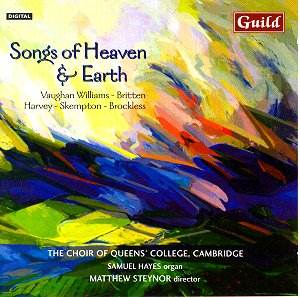The
choir of Queen’s College, Cambridge comprises (on this recording)
six sopranos, four female altos, three tenors and four basses.
For the two Harvey items three extra singers, one each of alto,
tenor and bass were added. This is not a full time choir in the
sense that they sing evensong daily: they sing services twice
weekly in addition to other concert and touring commitments. No
doubt because the choir is not full-time the college has no Director
of Music. Instead there are two organ scholars and the senior
of the two directs the choir during his (or her) final academic
year. On the evidence of this CD I’d suggest that this arrangement
has consequences. The choir has plenty of good musical qualities
but I felt there was evidence of the lack of an experienced guiding
hand to apply the final layer of polish in matters of balance
and blend. Interestingly, I felt that there was a better blend
and a fuller tone in the two items by Howard Skempton which were
directed by James Weeks, Matthew Steynor’s predecessor as Senior
Organ Scholar.
The
other handicap is that often the choir seems to lack weight of
tone, especially at the extremes: there is a tendency to shrillness
when the soprano line is under pressure and the bass line is appreciably
light in tone, for my taste at least.
The
chosen programme is interesting and varied, combining sacred and
secular pieces. The latter focus on the beauty of creation in
nature while several of the former were mainly written for specific,
special occasions and are consequently celebratory in tone.
The
first two Vaughan Williams items are well done. The chaste beauty
of Heart’s Music (track 1) is well handled and the singers
cope well with Valiant-for-Truth (track 2) which is demanding,
not least in terms of sustaining impetus and tension, although
I feel that the final climax, where the trumpets sound for Pilgrim,
needs more weight of tone, especially in the bass, than this choir
possesses. This lack of tonal weight is the main reason why I
think the performances of the Three Choral Hymns is rather
less successful: for instance in the Easter Hymn (track
12) the sopranos sound somewhat edgy while the bass line is too
light.
The
music of Brian Brockless is new to me. According to the notes
he was a "highly respected figure of the London church music
circle" and he was especially associated with the church
of St Bartholomew the Great. He wrote secular music too and this
part of his output is represented by There is a garden in her
face, a setting of words by Thomas Campion which was inspired
by the Coronation of Queen Elizabeth II. The pieces recorded here
don’t seem to me to break much new ground – they are strophic
and unashamedly tonal – and though enjoyable to hear I felt a
really individual voice was lacking.
This
is emphasised by the juxtaposition of Brockless’s music with that
of Britten. The Te Deum, which took him a mere two days
to write, has the distinctive voice which, for me, is missing
from Brockless’s music. For the most part it is performed effectively
here though the loud chords at the words "O Lord, in Thee
have I trusted" (track 6, 5’34") are dominated by sopranos
and tenors; another instance, I’m afraid, where balance and blend
are less than ideal and where the immaturity of some of the voices
is apparent. To counterbalance this reservation, however, there
is a really lovely, poised soprano solo sung by Kadia Acres. In
the Five Flower Songs I particularly enjoyed the sensitive
account of ‘The Evening Primrose’ (track 10).
The
dense, complex choral textures of the two very demanding pieces
by Jonathan Harvey are well realised and there is some accomplished
solo work. To my mind these pieces work best when sung by an all-male
choir where there is the added cutting edge of treble and male
alto voices. However, the Queen’s College singers make a very
good job of both works; indeed, these are probably the most successful
performances in the whole programme, especially I love the
Lord (track 17), which is quite outstanding.
In
general the recorded sound is good although I did wonder if the
chapel acoustic was a bit too reverberant for the Britten Flower
Songs. For the most part the notes are good although there
is one glaring error. In connection with Valiant-for-Truth
we are told that Vaughan Williams "embarked on a setting
of the entire Pilgrim’s Progress in the 1940s" which
was "abandoned." In fact, though I’m not sure RVW ever
contemplated a setting of Bunyan’s complete work, he began setting
parts of it to music in the 1920s. and the finished opera (or
"Morality" as he named it) was first staged at Covent
Garden in 1951. This error in the notes is all the more regrettable
since it was at Cambridge itself that the University Music Society
under Boris Ord revived the work, with much more success than
at Covent Garden, in 1954. Full English texts and a specification
of the organ are included in the documentation and the notes (only)
are also provided in German.
In
summary, this CD is something of a mixed blessing and I’m sorry
that I can only give it a qualified recommendation. The programme
is very interesting and it is good to see Oxbridge college choirs
other than the "usual suspects" represented on CD. However,
since the disc is a full priced release it has to be judged accordingly
and the choral singing, though it has much to commend it, not
least commitment, does display some shortcomings of which intending
purchasers should be aware.
John
Quinn

